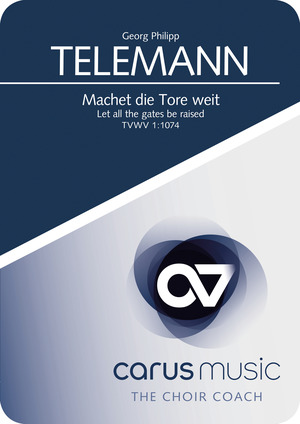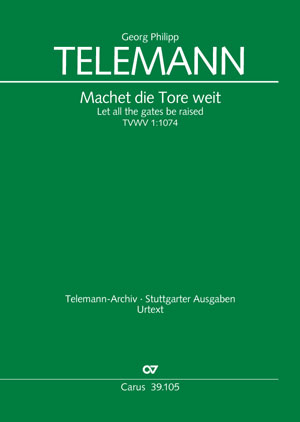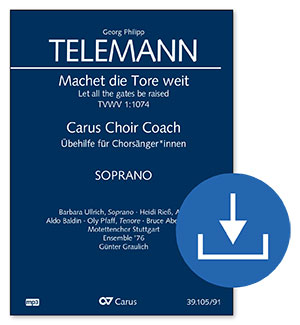
Let all the gates be raised
Cantate pour le 1er dimanche de l'Avent TVWV 1:1074
La cantate pour l'Avent "Machet die Tore weit" est depuis longtemps l'une des œuvres sacrées de Telemann les plus souvent interprétées. Parmi les autographes disponibles se trouve un témoignage précieux de l'estime que portait J.S.Bach à son collègue hambourgeois, autrefois bien plus célèbre que lui. En effet, on a retrouvé une copie de la partition effectuée de la mains du cantor de Leipzig, réalisée en vue d'une interprétation de cette cantate le premier dimanche de l'Avent 1734 (une date très proche de la création de l'Oratorio de Noël). Parmi les quatres solistes, deux sont indispensables, la soprane et le basse, qui ont chacun un air soliste. Les courts soli d'alto du chœur d'entrée peuvent être chantés par une choriste, tandis que le récitatif de ténor peut être chanté par la soprane solo.
Interprètes: Barbara Ullrich (Soprano), Heidi Rieß (Alto), Oly Pfeiff (Tenor), Bruce Abel (Basse) – Motettenchor Stuttgart, Ensemble '76 Stuttgart – Günter Graulich
Il suffit de s'exercer. Partout. A tout moment.
Que ce soit à la maison sur votre tablette ou votre PC ou en déplacement sur votre smartphone : avec carus music, the Choir Coach, vous avez toujours vos œuvres chorales avec vous pour vous entraîner ! Avec l'application chorale de carus music, vous pouvez écouter votre partition ainsi qu'un enregistrement de première qualité sur n'importe quel appareil et vous entraîner facilement à votre propre partie de chœur avec un coach. Avec carus music, la préparation de vos concerts est facile, efficace et amusante à maîtriser !
Interprètes: Barbara Ullrich (Soprano), Heidi Rieß (Alto), Oly Pfeiff (Tenor), Bruce Abel (Basse) – Motettenchor Stuttgart, Ensemble '76 Stuttgart – Günter Graulich
Acheter
Informations complémentaires sur l'œuvre
Sommaire
-
Compositeur
Georg Philipp Telemann
| 1681-1767Telemann's extremely rich compositional output, the fruits of three quarters of a century's work, encompasses almost all genres of music; in his vocal works it ranges from songs with basso continuo accompaniment to chamber and church cantatas, and to opera. In his own assessment, church music played a central role in his output; he alone probably composed over 1,600 church cantatas, as well as cantata-style funeral music settings (such as Du aber, Daniel, gehe hin), psalm settings (for example, Deus judicium tuum) and oratorios. Throughout his works Telemann showed himself to be a progressive composer, open to new trends and keen to experiment whilst exploring new directions; not without reason was he called a forerunner of classicism. However, his compositions constitute only a part of his importance to music history: as a music publisher, the author of publications for teaching, the director of middle-class music societies and initiator of public concerts, he made a considerable contribution to creating the preconditions for the support of the musically-educated middle classes in the ensuing era of music. Plus d'information sur la personne
-
Basse continue réalisée
Traugott Fedtke
| 1909-1988
-
Traducteur
Jean Lunn
-
Ensemble
Motettenchor Stuttgart
-
Ensemble
Ensemble '76 Stuttgart
The Ensemble Stuttgart (Ensemble '76) was founded by Wolfgang Rösch in 1976 and is made up of solo players, musicians from Stuttgart orchestras and music students. Its repertoire comprises pieces for chamber orchestra, including the Bach Brandenburg Concertos as well as symphonies by Haydn, Mozart and Schubert, and chamber music, including the sextets of Brahms and Tchaikovsky and the Mendelssohn Octet. In addition it plays contemporary pieces, some of which were written for this ensemble. The Ensemble Stuttgart gives concerts in Germany, France, Italy and Belgium, and has been involved in many CD and radio productions. Plus d'information sur la personne
-
Chef d'orchestre
Günter Graulich
| 1926L'éditeur, cantor et pédagogue Günter Graulich est l'un des éditeurs importants de l'après-guerre en Allemagne. En 1972, il fonda avec son épouse Waltraud les Editions Carus-Verlag, qu'il fit évoluer d'un bureau de 2 personnes à une entreprise de près de 60 employés. Lui-même cantor pendant de longues années à l'église St Matthieu de Stuttgart, il dirigea pendant plus de 50 ans le Motettenchor Stuttgart. Il réalisa avec ce chœur plusieurs enregistrements sur disques vinyls et CD, et de nombreuses tournées à travers l'Europe et l'Amérique. Plus d'information sur la personne
-
Solist - soprano
Barbara Ullrich
-
Solist - alto
Heidi Rieß
-
Solist - ténor
Oly Pfaff
-
Solist - basse
Bruce Abel
Questions fréquentes sur l'œuvre
 Il n'y a pas encore de questions et réponses concernant cette œuvre ou vous n'avez pas trouvé la réponse à votre question sur l'œuvre ? Cliquez ici et envoyez votre question spécifique à notre service clients.
Il n'y a pas encore de questions et réponses concernant cette œuvre ou vous n'avez pas trouvé la réponse à votre question sur l'œuvre ? Cliquez ici et envoyez votre question spécifique à notre service clients.







